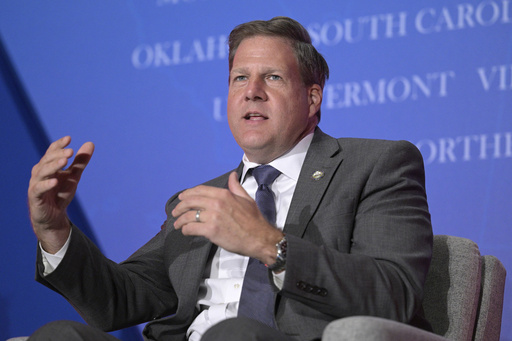NEW YORK (AP) — When No Labels’ critics got the loudest, it was Joe Lieberman who came to the group’s defense.
The former Connecticut senator was a founding chairman of the centrist organization that focused, above all, on promoting bipartisanship in national politics. Despite its benign stated mission, No Labels inflamed many people across politics by working to recruit a third-party presidential candidate that some fear might tilt the 2024 election in Donald Trump’s favor.
At almost every major turn, Lieberman served as the group’s chief public defender. He was also a private force in No Labels’ presidential recruitment push. He insisted repeatedly in interviews, as recently as last week, that the nation is craving an alternative to Trump and President Joe Biden.
“This is the moment for a bipartisan unity ticket,” Lieberman told Bloomberg Television last Thursday. “Now, we’ve just got to find a strong bipartisan ticket to recommend to the No Labels delegates in the next couple of weeks. That’s not easy.”
Now, Lieberman is gone. He died on Wednesday due to complications from a fall. He was 82.
Lieberman’s death not only marks an irreplaceable loss for No Labels, it injects a new level of uncertainty into the organization’s 2024 ambitions.
Just hours before news of his death was reported this week, former New Jersey Gov. Chris Christie, who twice ran unsuccessfully for the GOP nomination, announced his decision not to join No Labels’ presidential ticket. It was the latest in a string of high-profile rejections for the group, which has nonetheless secured a spot on presidential ballots in more than a dozen states.
Already, No Labels had courted and been denied by would-be White House contenders in both parties including Maryland Gov. Larry Hogan, Sen. Joe Manchin, D-W.Va., Sen. Mitt Romney, R-Utah, and Georgia Gov. Brian Kemp.
On Thursday, a fresh wave of critics called on No Labels to abandon its 2024 plans.
“At this point I’m not sure what else the No Labels crowd needs to hear. Every serious person who has taken a look at this gambit immediately sees they would just be helping to elect Donald Trump,” Sarah Longwell, who founded Republican Voters Against Trump, wrote on X. “Time for No Labels and its donors to pull the plug.”
No Labels’ leadership declined to address its 2024 plans on Thursday given Lieberman’s passing. His funeral was scheduled for Friday.
But new details emerged in the group’s struggle to persuade strong candidates to join its presidential ticket.
Lieberman was intimately involved in recruitment conversations with potential candidates. He participated in introductory Zoom calls and maintained regular contact with top prospects, including Christie.
The former New Jersey governor’s team looked seriously at a potential No Labels’ bid. His advisers did polling, modeling and studied the fundraising challenges, according to a person familiar with Christie’s thinking, granted anonymity to disclose private conversations.
Ultimately, Christie determined that a No Labels’ ticket was not viable, despite the organization’s insistence to the contrary.
“While I believe this is a conversation that needs to be had with the American people, I also believe that if there is not a pathway to win and if my candidacy in any way, shape or form would help Donald Trump become president again, then it is not the way forward,” Christie said Wednesday in a statement.
Another high-profile Republican Trump critic, New Hampshire Gov. Chris Sununu, was also in regular contact with No Labels in recent months. Sununu, who briefly considered a Republican White House bid, has announced he will not seek reelection this fall.
Sensing opportunity, No Labels repeatedly reached out to Sununu and indicated that he was one of their top choices based on focus group data, according to a Sununu adviser who spoke on the condition of anonymity to disclose private discussions.
Sununu repeatedly told No Labels advisers that he wasn’t interested, the adviser said. No Labels reached out again in early March to gauge Sununu’s interest, and the New Hampshire governor again said no.
Still, No Labels appears to be pushing forward.
The group announced on Wednesday, just before news of Lieberman’s death emerged, that it had secured ballot access in Wyoming. That makes 19 states, including swing states Arizona and Nevada, in which No Labels says it has officially qualified for the presidential ballot.
While that’s more than third-party candidate Robert F. Kennedy Jr. has confirmed so far, it’s far from the number of states a candidate will need to have a legitimate chance to win the presidency.
Yet it was Lieberman himself who penned a message earlier in the month outlining a path forward.
He wrote that he was part of a No Labels committee dubbed, “Country Over Party,” which was in charge of identifying candidates for the unity ticket.
“If we find two candidates that meet our high threshold, we will recommend that ticket to No Labels’ delegates for a nomination vote at a National Nominating Convention that will be held later this spring,” Lieberman said just two weeks ago. “If No Labels is unable to find candidates who meet this high threshold, then we simply will not offer our ballot line to anyone.”
“We remain undeterred and confident in our mission,” Lieberman continued, “because we know we have America’s vast commonsense majority behind us.”
___
Associated Press writers Jonathan J. Cooper in Phoenix and Jill Colvin in New York contributed.
This website uses cookies so that we can provide you with the best user experience possible. Cookie information is stored in your browser and performs functions such as recognising you when you return to our website and helping our team to understand which sections of the website you find most interesting and useful.
